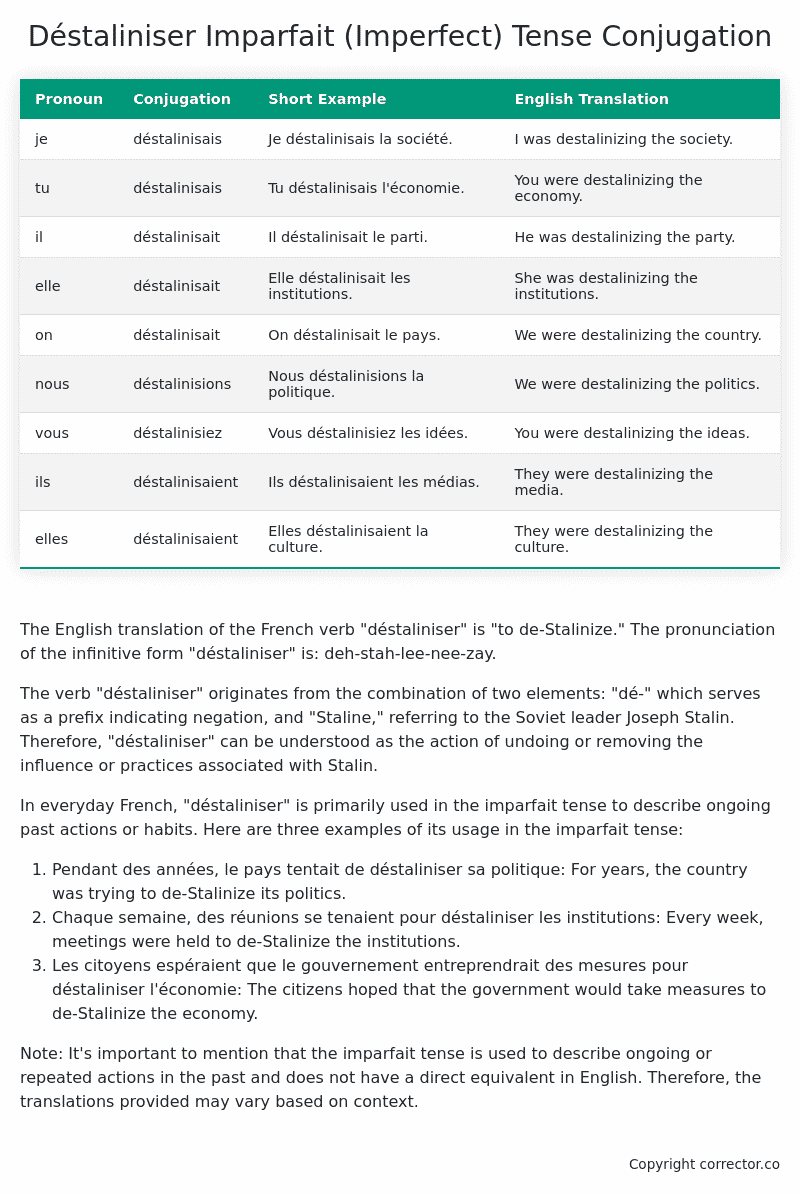Imparfait (Imperfect) Tense Conjugation of the French Verb déstaliniser
Introduction to the verb déstaliniser
The English translation of the French verb “déstaliniser” is “to de-Stalinize.” The pronunciation of the infinitive form “déstaliniser” is: deh-stah-lee-nee-zay.
The verb “déstaliniser” originates from the combination of two elements: “dé-” which serves as a prefix indicating negation, and “Staline,” referring to the Soviet leader Joseph Stalin. Therefore, “déstaliniser” can be understood as the action of undoing or removing the influence or practices associated with Stalin.
In everyday French, “déstaliniser” is primarily used in the imparfait tense to describe ongoing past actions or habits. Here are three examples of its usage in the imparfait tense:
- Pendant des années, le pays tentait de déstaliniser sa politique: For years, the country was trying to de-Stalinize its politics.
- Chaque semaine, des réunions se tenaient pour déstaliniser les institutions: Every week, meetings were held to de-Stalinize the institutions.
- Les citoyens espéraient que le gouvernement entreprendrait des mesures pour déstaliniser l’économie: The citizens hoped that the government would take measures to de-Stalinize the economy.
Note: It’s important to mention that the imparfait tense is used to describe ongoing or repeated actions in the past and does not have a direct equivalent in English. Therefore, the translations provided may vary based on context.
Table of the Imparfait (Imperfect) Tense Conjugation of déstaliniser
| Pronoun | Conjugation | Short Example | English Translation |
|---|---|---|---|
| je | déstalinisais | Je déstalinisais la société. | I was destalinizing the society. |
| tu | déstalinisais | Tu déstalinisais l’économie. | You were destalinizing the economy. |
| il | déstalinisait | Il déstalinisait le parti. | He was destalinizing the party. |
| elle | déstalinisait | Elle déstalinisait les institutions. | She was destalinizing the institutions. |
| on | déstalinisait | On déstalinisait le pays. | We were destalinizing the country. |
| nous | déstalinisions | Nous déstalinisions la politique. | We were destalinizing the politics. |
| vous | déstalinisiez | Vous déstalinisiez les idées. | You were destalinizing the ideas. |
| ils | déstalinisaient | Ils déstalinisaient les médias. | They were destalinizing the media. |
| elles | déstalinisaient | Elles déstalinisaient la culture. | They were destalinizing the culture. |
Other Conjugations for Déstaliniser.
Le Present (Present Tense) Conjugation of the French Verb déstaliniser
Imparfait (Imperfect) Tense Conjugation of the French Verb déstaliniser (You’re reading it right now!)
Passé Simple (Simple Past) Tense Conjugation of the French Verb déstaliniser
Passé Composé (Present Perfect) Tense Conjugation of the French Verb déstaliniser
Futur Simple (Simple Future) Tense Conjugation of the French Verb déstaliniser
Futur Proche (Near Future) Tense Conjugation of the French Verb déstaliniser
Plus-que-parfait (Pluperfect) Tense Conjugation of the French Verb déstaliniser
Passé Antérieur (Past Anterior) Tense Conjugation of the French Verb déstaliniser
Futur Antérieur (Future Anterior) Tense Conjugation of the French Verb déstaliniser
Subjonctif Présent (Subjunctive Present) Tense Conjugation of the French Verb déstaliniser
Subjonctif Passé (Subjunctive Past) Tense Conjugation of the French Verb déstaliniser
Subjonctif Imparfait (Subjunctive Imperfect) Tense Conjugation of the French Verb déstaliniser
Conditionnel Présent (Conditional Present) Tense Conjugation of the French Verb déstaliniser
Conditionnel Passé (Conditional Past) Tense Conjugation of the French Verb déstaliniser
Conditionnel Passé II (Conditional Past II) Tense Conjugation of the French Verb déstaliniser
L’impératif Présent (Imperative Present) Tense Conjugation of the French Verb déstaliniser
L’impératif Passé (Imperative Past) Tense Conjugation of the French Verb déstaliniser
L’infinitif Présent (Infinitive Present) Tense Conjugation of the French Verb déstaliniser
L’infinitif Passé (Infinitive Past) Tense Conjugation of the French Verb déstaliniser
Le Participe Présent (Present Participle) Tense Conjugation of the French Verb déstaliniser
Le Participe Passé (Past Participle) Tense Conjugation of the French Verb déstaliniser
Struggling with French verbs or the language in general? Why not use our free French Grammar Checker – no registration required!
Get a FREE Download Study Sheet of this Conjugation 🔥
Simply right click the image below, click “save image” and get your free reference for the déstaliniser imparfait tense conjugation!

Déstaliniser – About the French Imparfait Tense
NOTE: To take a deep dive into all the French tenses then see our article on Mastering French Tense Conjugation.
Formation of the Imparfait Tense
For regular -er verbs:
For regular -ir verbs
For regular -re verbs
Common Everyday Usage Patterns
Description of Past Habits
Background Information
Mental and Emotional States
It’s employed to express emotions, thoughts, or physical sensations in the past. For example: “J’étais content quand il est arrivé.” (I was happy when he arrived.)
Ongoing Actions
Points to Note About the Imparfait Tense
Passé Composé vs. Imparfait
Conditional
Si Clauses
Narration
I hope you enjoyed this article on the verb déstaliniser. Still in a learning mood? Check out another TOTALLY random French verb imparfait conjugation!


